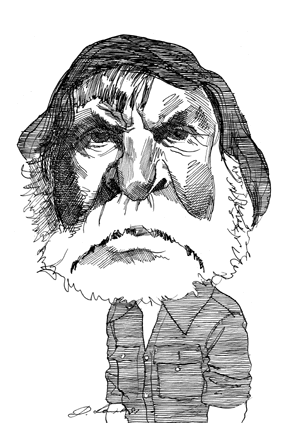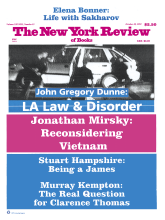In both Mating and Brazzaville Beach, a smart young female scientist comes to Africa to do field research, encounters an older man who is an academic celebrity, and finds her life radically altered by the experience. These are of course timely matters: post-colonial anxiety in the white West, the tribulations of women in patriarchal professions, current debates about scientific dishonesty and the authority of science itself. But these books are quite different in effect, if only because each author has a different sense of Africa. William Boyd, an Englishman still in his thirties, was born in Ghana; two of his four earlier novels—A Good Man in Africa and An Ice-Cream War—considered the ironies of white rule at its zenith and in its twilight. Norman Rush, an American in his late fifties, served in the Peace Corps in Botswana from 1978 to 1983; his much-admired collection of stories, Whites, drew on his experience there, and, like Whites, Mating, his first novel, examines Western good intentions in a non-Western world.
The narrator and heroine of Mating, who appears earlier in a story in Whites, is a Ph. D. candidate who came to Botswana from Stanford in 1980 to work on her dissertation in nutritional anthropology. Her project, to show that the reproductive rate of gatherers is affected by the foods they can find at various times of year, fails miserably, since there no longer are any gatherers in Botswana, where the native peoples now eat canned goods, cornflakes, and surplus grains sent by relief programs. Africa, in fact, is a disappointment generally. In Gaborone, the capital, which looks like a college town in the American Southwest of the 1960s, white expatriates compete fiercely for the limited supply of crème fraîche, while the Batswana themselves, except for the politicians, seem to want too little and generally take things easy.
In a book rich in circumstantial detail this interesting woman never is named. She is a brilliant creation particularly in her language, which captures the unquenchable flip-hip patter of her skeptical generation and subculture, as well as the worried seriousness which that patter, far from concealing, expresses all the more poignantly. When she visits Victoria Falls and feels “enormous sadness” at its intimation of her own mortality, she remarks:
I think the falls represented death for the taking, but a particular death, one that would be quick but also make you part of something magnificent and eternal, an eternal mechanism. This was not in the same league as throwing yourself under some filthy bus. I had no idea I was that sad. I began to ask myself why, out loud…. One sense I had was that I was going to die sometime anyway. Another was that the falls were something you could never apply the term fake or stupid to. This has to be animism, was another feeling. I was also bemused because suicide had never meant anything to me personally, except as an option it sometimes amazed me my mother had never taken, if her misery was as kosher as she made it seem. There was also an element of urgency underneath everything, an implication that the chance for this kind of death was not going to happen again and that if I passed it up I should stop complaining—which was also baseless and from nowhere because I’m not a complainer, historically. I am the Platonic idea of a good sport.
This Issue
October 10, 1991






